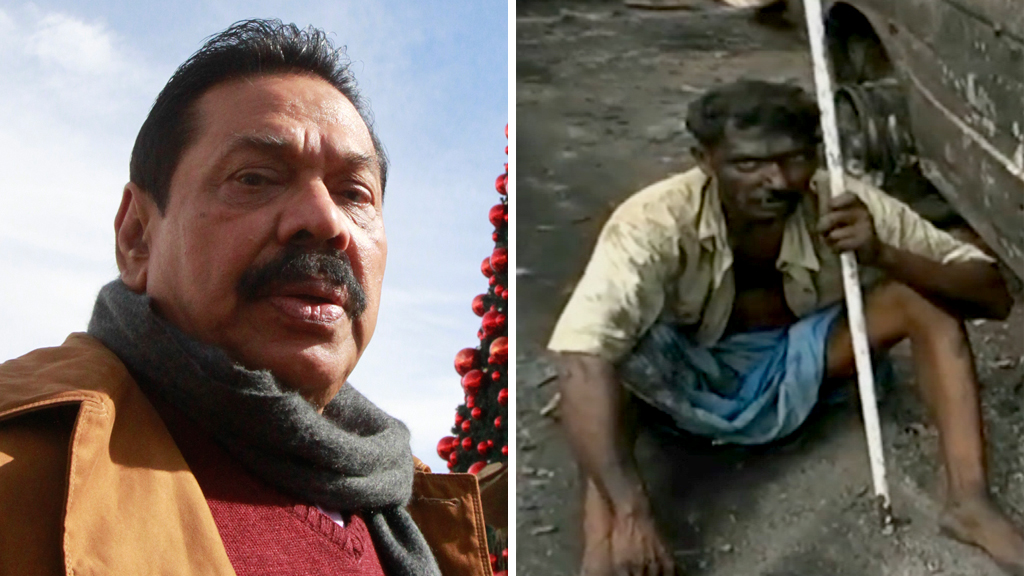UN to vote on ‘monumental’ Sri Lanka war crimes inquiry
Almost exactly five years after Sri Lanka’s civil war ended, the UN Human Rights Council is preparing to vote on a US and UK-led resolution which would mandate the UN to launch a war crimes inquiry.

For the council, this represents a dramatic change of tack. Ten days after the conflict ended, it passed a resolution which actually congratulated the Sri Lankan government on bringing the war to an end.
But as time has passed, evidence has mounted that the war ended in a bloodbath.
Although both the government and the rebel Tamil Tigers were accused of committing war crimes, earlier UN investigations have reported that at least 40,000 Tamil civilians were killed in the final few months of the conflict, mostly by government shelling.
The Sri Lankan government has resolutely and continually denied this and has strenuously sought to block efforts to initiate an international investigation. In recent days, human rights activists, whom the government has suspected of lobbying for an inquiry, have been rounded up in Sri Lanka and interrogated under anti-terrorist laws.
Frantic lobbying
The UN vote requires a simple majority from among the council’s 47 members. Those who have been drafting the resolution believe the maths is in their favour, but at the UN’s Palais des Nations in Geneva, lobbying has been frantic in recent days and the horse-trading, fierce.
Diplomats say that some of the wording which Tamil groups and international human rights activists had wanted to see in the resolution has been diluted by the demands of real politik. China and Russia and Cuba now sit on the council – whose members rotate. All three countries are understood to be among those supporting Sri Lanka’s position.
The draft wording seen by Channel 4 News – which will be close to the final version that’s voted on – mandates the Office of the UN Commission for Human Rights to “undertake a comprehensive independent investigation into alleged serious abuses of human rights and related crimes by both parties in Sri Lanka” between 2002 and the present.
The investigation would, the draft resolution states, “establish the facts and circumstances of such alleged violations and of the crimes perpetrated with a view to avoiding impunity and ensuring accountability…”
Grave allegations
Channel 4 News has interviewed witnesses over many years who have maintained that command responsibility goes right to the top.
Sri Lanka’s President Mahinda Rajapaksa, and his brother, Defence Secretary Gotabaya Rajapaksa, have been repeatedly named as having directly ordered or been complicit in alleged war crimes and other serious human rights violations.
On Wednesday, the UN Human Rights Commissioner, Navi Pillay – who recently published an excoriating report on past and continuing human rights abuse in Sri Lanka – spoke of the magnitude and gravity of violations committed by both sides during the civil war.
She recommended that the Human Rights Council vote tomorrow to establish an independent international inquiry to investigate these allegations.
Her call was categorically rejected by Sri Lanka’s ambassador to the UN in Geneva, Ravinatha Aryasinha. Earlier this month, the Sri Lankan Minister of External Affairs, G L Peiris, branded Ms Pillay’s report biased and unfair and rejected it “in its entirety.”
The government has consistently denied all allegations thrown at it over the years, despite the growing body of evidence.
Monumental importance
Three months after the war ended, the government denied that its forces were responsible for the cold-blooded execution of bound, naked, blindfolded Tamil prisoners, as depicted in footage broadcast by Channel 4 News.
The government insisted the pictures were “fake” – although the government recently said the army had appointed a court of inquiry to look into “the identification of potential witnesses.” Earlier, independent experts – including a pathologist, a ballistics specialist and a forensic video analyst – who had been commissioned by the UN, said they judged the footage to be genuine.
The government has also denied allegations that during the final months of the conflict, its forces had deliberately and repeatedly targeted hospitals in what they bizarrely declared the “No Fire Zone.” The hospitals were crammed full of wounded civilians. The shelling of hospitals would constitute a war crime under international law.
As we now know, one of the government doctors who originally made those allegations, has told Channel 4 News that his original assertions were accurate. He accuses the Sri Lankan regime of strong-arming the doctors into denying their claims under duress (see video, above).
If the UN Human Rights Council now votes to establish an investigation into possible war crimes that doctor’s testimony will likely prove critical.
The still-traumatised survivors of the government’s final assault view tomorrow’s vote in Geneva as monumentally important. To them, a UN-led investigation into the allegations they’ve made all along, would represent a first step towards justice, without which Sri Lanka is unlikely to ever move on.
-
Latest news
-
‘I never read anything like that before’: Benedict Cumberbatch new Netflix series Eric4m

-
Thousands buried alive after Papua New Guinea landslide2m

-
Starmer on what he would say to Netanyahu – after Rafah attack7m

-
Netanyahu calls Rafah attack ‘tragic mistake’7m

-
Why is the UK not exploiting technology for net zero trains?6m

-




